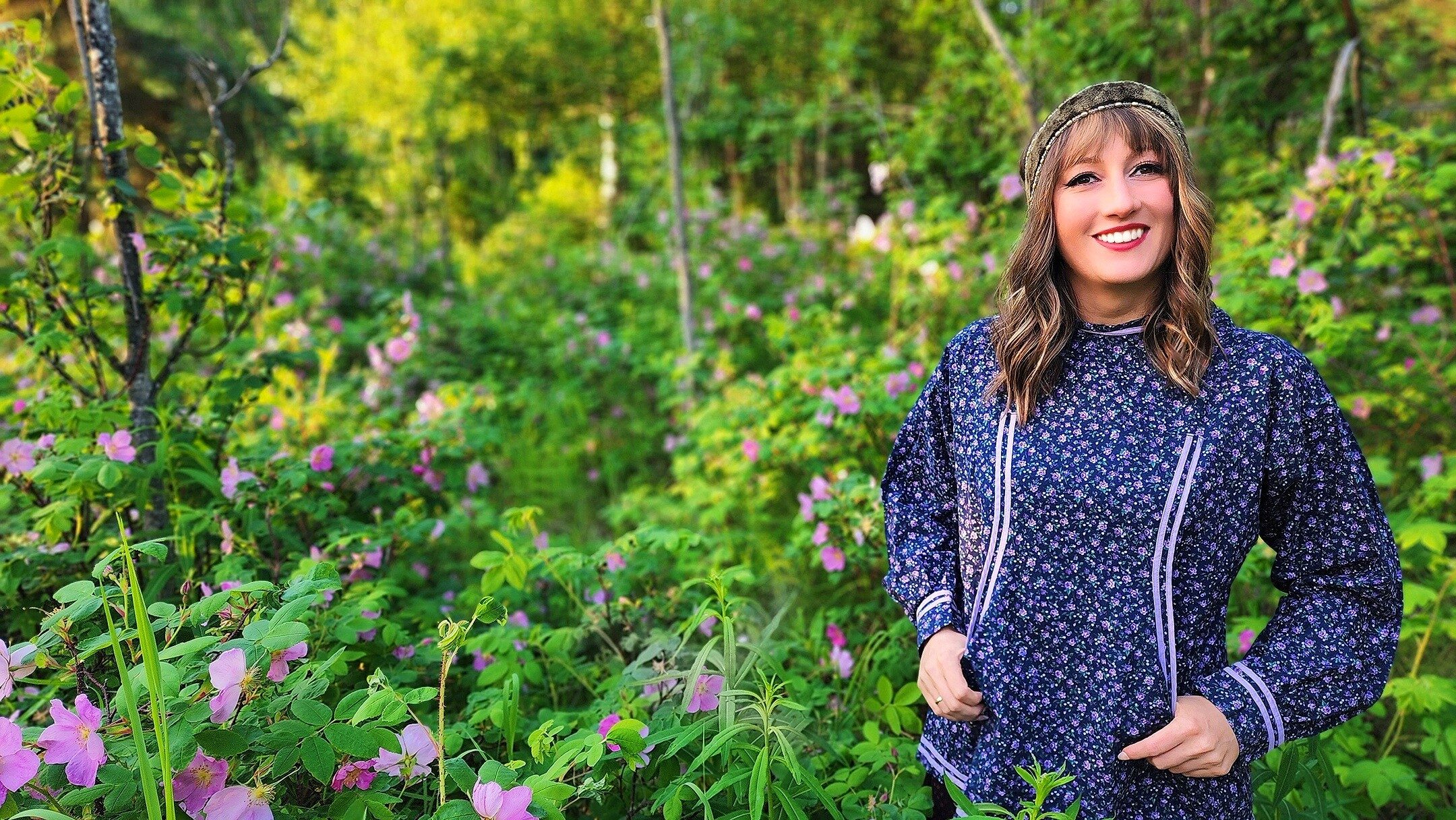
Our Students
If there’s one thing we like to do, it’s highlight the successes of our students. Below you’ll find updates provided to us by our current and former scholarship recipients. If you would like to share your news, please email us!
Clifford Sheehan, an Inspection Services Lead on the Trans Alaska Pipeline System (TAPS), has been making strides in ensuring the integrity and safety of one of Alaska’s major infrastructure projects. Clifford directs the inspections program on TAPS and represents APSC Inspection Services (IS) to internal departments, TAPS contractors, and external agencies. His role is critical in ensuring that the Inspection Program users receive compliant and efficient records, verifying that work is performed according to the required criteria.
Clifford has been the recipient of KEF Career Development Grants and Vocational Awards, which have been instrumental in helping him to excel in the oil and gas sector. These scholarships and grants have enabled him to further his knowledge of crucial inspection methods and have played a significant role in his career development.
Speaking about the support he received, Clifford stated, “The scholarships and grants I have received have meant my continued education in inspection methods used in the Oil and Gas industry. KEF has provided the support needed to make me more valuable as an employee and manager to the companies I represent. Without them, I wouldn’t have come this far in my career, and I appreciate all the support.”
Clifford’s story demonstrates the impact of lifelong learning and the role of organizations like KEF in fostering skill development and supporting Koniag Shareholders and Descendants to excel in their careers.
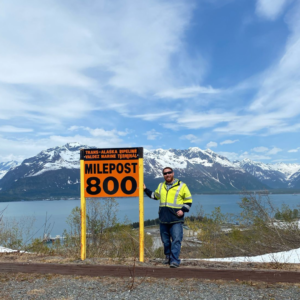
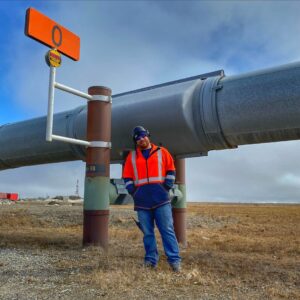
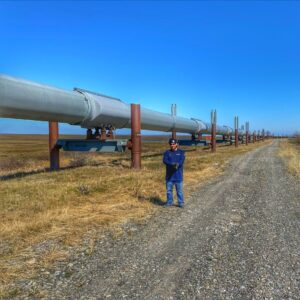
– LESS
Hello! My name is Keelin, and I belong to the Sun’aq Tribe of Kodiak. I am also a Koniag Shareholder, second-year Angayuk Intern, KEF General scholarship recipient, and KEF Student Advisory Committee member.
I am currently studying abroad at the University of Birmingham, England, studying Political Science and International Relations. I had always wanted to study in the United Kingdom and found that Birmingham is the perfect location for me. Here, you can attend classes during the week and travel on the weekends to explore.
Studying abroad comes with so many opportunities to learn outside of the traditional academic environment. Adjusting to new cultures, accents, foods, and etiquette is a unique experience that has broadened my view and daily interactions. Some of the most important things I’ve learned so far are that accents vary heavily by area, to always invest in a rail card/coach card for travel discounts, and that people here are willing to help if you need it. I am only halfway through my stay here, and I have already seen the Hogwarts corridors in Gloucester, Kirkstall Abbey in Leeds, Shakespeare’s Home in Stratford Upon Avon, and many other unique places!
My advice for those wanting to study abroad is to say yes to opportunities as much as possible, get out of your comfort zone occasionally, and visit the small attractions tourists often overlook. Additionally, when choosing a community, I greatly recommend picking a place that isn’t a top vacation spot that gets a lot of attention from visitors.
In the future, I plan to pursue law school and specialize in Environmental or Indigenous law. I’ve always wanted to engage in this field, and my identity as an Alaska Native has greatly influenced which kind of practice I hope to do.
KEF has helped me immensely with my educational career and continues to be a cheerleader for my future goals. The financial help I receive from KEF allows me to study abroad. I can pick a spot on the map and explore! With their encouragement, I have the means to make life-changing decisions like studying abroad and have an entire group of people rooting for me along the way!
– LESS
Walking the New York Runway
I am Alutiiq/Sugpiaq and Omaskeko Ininu/Cree. I am a member of the Moose Cree First Nation band from Moose Factory Island in Northern Ontario and a tribally enrolled member of the Native Village of Afognak and the Native Village of Port Lions. My family in Alaska includes the Lukins, Knagins, Sheratines, and Demetoffs.
I graduated from McMaster University in the Fall of 2022 with an Honours Bachelor of Arts degree in Indigenous studies and a minor in Art History.
Koniag Education Foundation supported my education each year of my degree program. Without their support, I could not have attended university and completed my degree, especially in the midst of the pandemic.
One of the biggest challenges while pursuing my education was finding a space where I fit in. I struggled to fit into Western spaces. I searched to figure out what kind of career I wanted, where I would feel accepted for who I am. In my fourth year at McMaster University, I decided to do an honours thesis with my supervisor, Adrianne Xavier. Through this thesis, I looked at the connection between fashion and material culture in relation to Indigenous identity. Indigenous people have such a rich and diverse culture which is beautifully expressed through clothing and art. Through my education and final thesis project, I realized I wanted to work in these spaces in different capacities. I just started putting myself out there and connecting with those who wanted to support me.
Recently, I had a very positive experience at New York Fashion Week walking for Mushkegowuk, two-spirit designer, Scott Wabano. I was nervous to walk in the runway show since modeling is still very new to me, but the designer, the models, and everyone made me feel welcome and supported. It was a powerful show to be a part of, and it meant a lot to me to witness all the work that goes into creating space for Indigenous designers, artists, and models in the fashion industry.
Currently, I’m focused on my new modeling career and supporting my parents, Duane Linklater and Tanya Lukin Linklater. I am a studio assistant at my father’s artistic practice and a research assistant for my mother. In the middle of it all, I also make time to attend cultural events such as round dances in Northern Ontario.
I encourage Indigenous youth to get their education because it opens opportunities. Post-secondary looks different for everyone, but it’s still important to pursue because there are more and more resources to support you in receiving your education, such as Koniag Education Foundation, Indigenous student support services on campus, or Indigenous faculty.
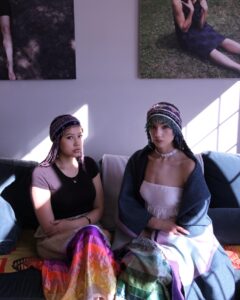
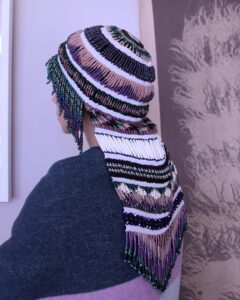
– LESS
Marya Halvorsen was born in Kodiak to the late Harold “Sunny” Halvorsen and Melayna Halvorsen. She was raised by her mom, who stayed close to her father’s family after he passed away. Together with her sister Louise, she spent a large portion of her youth running in and out of her aunt’s home, which was the heart of their family. There they gather for family dinners, play cards, and share conversations over cups of steaming tea.
After high school, she chose an alternative path and went straight to work before eventually finding her way home to Kodiak. Through working within the Native community in cultural and language education, Halvorsen developed a strong sense of the importance of being of service to her people. After some time, she understood there were numerous ways she could support her community, so she began her educational journey at the University of Alaska Anchorage (UAA).
Being close to home was an important reason why Halvorsen chose to study at UAA. During her time at UAA, she continued to find ways to be of service. This included serving on KEF’s Student Advisory Committee and an ad hoc working group formed by the previous Chancellor at UAA, addressing gender and violence. A highlight of her time at the university was her annual participation in the Model United Nations program as a committee Chair, which led to a memorable weeklong internship at the United Nations during the Permanent Forum on Indigenous Issues.
The biggest challenge she faced was juggling the sporadic last-minute sprints to get work turned in and learning to create systems to keep herself organized. When she felt disengaged, she changed up the scenery. She got up, left her home, and studied at the library and various coffee shops in her area. Many coffees later, in 2021, Halvorsen earned a bachelor’s degree in political science with a minor in Alaska Native studies, achieving university and department honors. She is a member of Pi Sigma Alpha, the National Political Science Honor Society. Today, you can find her serving the Alutiiq community as a Public Policy and Government Affairs Specialist at Koniag.
Halvorsen shared, “Koniag Education Foundation made my education possible. Being a student at this stage of life, I’m not sure that I would have tackled a degree if I had to take on a large debt burden to reach that goal. KEF provided a large portion of the funding I needed to get my degree but also offered plenty of words of encouragement, friendly faces, and great care packages.”
Halvorsen advises students that when you have a problem, communicating with your professors is the best thing to do. If you think you will miss class, email them ahead of time so you will not miss out on any important homework or announcements. If you need help, go to your professor’s office hours, and if they don’t work with your schedule, talk with your professor to find a time that works for both of you.
– LESS
My journey to studying abroad in college began in my college decision process during high school. There were two things I knew for certain about the University I chose: I wanted to be able to play football at the collegiate level, and I wanted to have ample opportunities to study away. This thought process brought me to Pacific Lutheran University, where I have now done both.
After years of waiting for my chance to study away because of the obstacles of COVID, I made it to my first country of choice, Norway. Having family stem from Norway, I knew I wanted to see the place where a piece of my family is rooted. While playing football in the fall semester of 2021 at PLU, I chose to study abroad in the spring semester of 2022 – bringing along two of my best friends to accompany me in my studies across the world. Studying in Norway was not only a first option for me because of family, but because of one of the courses it offered in a small town called “Bo.” In this countryside town, sat a small campus from the University of South Eastern Norway. In this town I would take my studies to the next level in a course that entailed learning how to become a guide for outdoor activities. But because this was spring, or winter in Norway, that left me with no choice but to study “Outdoor Leadership and Backcountry skiing,” as well as kayak guiding towards the end of the semester. This course is a three year baccalaureate program that is designed to go through different outdoor sports in its teachings; I merely came for the skiing section. Don’t get me wrong, I was as excited as ever, but mind you, this course was also designed for students with ample ski experience – and I had never skied…
This didn’t stop me from applying to the University of South Eastern Norway to get into this program. Sure, I had to exaggerate a bit of my experience – which then led me to being the only one in the class who had never skied before, but I made it work once I arrived in Norway! The toughest part at that point in my journey was just getting there, but boy oh boy I had no idea what I was in store for with this course. None of us did. This outdoor program in Norway had never been done by a PLU student before, and the Norwegian university had not received a lot of American international students in comparison to the other nationalities present. This meant that my home university, PLU, did not entirely know what this course involved – and neither did I.
In the first few weeks of class we were thrown right into the fire. I was given a pair of skis, and was told to practice around town (completely covered in snow) until I was prepared enough for the first ski trip in a week. I had a lot of bruises the first few days… but by the time the first ski trip came around, you could not tell my experience was any less than that of my classmates. Preparing for trips meant going over lists of gear and food to bring, as well as creating a route that we would follow for the days we planned to be in the terrain. The first trip was the winter forest trip, which lasted 6 days in the forest – where we slept under tarps that we hung from trees, cooked our own dried food every night, and skied along our route until the sun was low enough to signal that it was time to start setting up the new camp for the night. This first trip trained me how to thrive in the snow, ski with a 60 pound pack on after just learning how to ski a week prior, and to remember to bring more toilet paper. The whole basis of this program was meant to make you learn on your own by your own trial and error. Are you cold? Then what can you do to make yourself warmer? Being comfortable in the cold terrain of Norway was the name of the game. And if you were comfortable, then you were able to focus on learning how to use a compass to follow the route, make shelter, gather water, and anything else that was a part of the grading agenda to becoming an outdoor guide in Norway. This first trip was a huge learning experience for what was to come.
The rest of the semester meant preparing for more outdoor trips, executing them, and then writing the different methods we used to thrive in the weather in an ‘after action report.’ It was unbelievable to think that we were receiving college credit for all of this, especially when I found myself walking out of a snow cave on my 21st birthday to ski through the mountains during a complete whiteout. I believe that sentence in itself deserves some insight. This scenario was one of many crazy experiences I faced during the hardest part of my time in Norway – navigating through the mountains of Norway for 10 days. I have never faced harsher weather, and it only made me think what could I have done to deserve such weather on my 21st birthday!? The day previous to the whiteout we slept in snow caves that our instructor showed us how to make. The process was long and wet, but fulfilling once completed. If I had the choice to do it again then I would politely reach for a tent. Purely because of how wet it made us for the rest of the trip (there was no way we could dry off in the mountains – no trees to make fires). The next day we tried to ski along the designed route as far as we could make it, but we were ultimately hindered by the effects of the whiteout (we could not see one foot in front of us). The mountains of Norway made you think very carefully about every choice you made; perfection was the only option to thrive, and stay comfortable enough to complete the trip. Not everyone ended up making it unfortunately… No, they did not die! But they were instead picked up by Norwegian ambulances on snowmobiles that came to the rescue due to either injuries, or dehydration. By the end of the trip, I had never felt such accomplishment – and colder feet. But I had truly thrived in the winter mountains of Norway for 10 long days. All of us had.
Once the skiing portion of the class was finished, we began kayaking. The plan was the same in regards to how we did our trips with planning, and leadership practice. However, now on this trip there was no more snow! This section was my favorite of the semester, as we island hopped for 5 days in the Southern ocean of Norway – even kayaking next to walruses. After completing the program, we designed our semester to make it so that we stayed in Norway for a month and a half longer than the class lasted. This gave us our chance to travel Europe, and any other sights that we hadn’t seen up to that point in Norway. In 1 month we were able to take a ferry to Denmark, fly to Spain for 2 weeks, head to Greece, Italy, Slovakia, Czech Republic, and Poland before coming back home to Norway on a $9 flight. Yes, you read that right! This last month was the cherry on top to my time abroad, and gave me more stories and experiences than I had ever could have imagined.
I truly believe studying away, and traveling abroad in general is the ultimate tool to improving who you are. What I mean by this is you become a more well rounded person from the things that are thrown at you, and the different cultures that you experience. You become a better conversationalist, a more adaptable individual, a person who is globally educated by different methods of teaching, and a more interesting person – all the while creating opportunities for yourself to make friends and connections all over the world. Luckily for me, my semester abroad was no more expensive than paying for a semester’s tuition at PLU. However, the price of the gear alone made it so that I needed all of the financial help I could get to take my education to Norway. I am absolutely grateful for the outside scholarships I was able to receive from both Koniag, and Afognak to help fund my journey abroad. I cherish the friends that I made across the world, the stories I am now able to tell, and a little town called Bo, Norway.
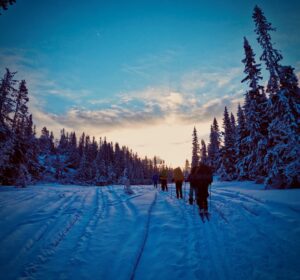
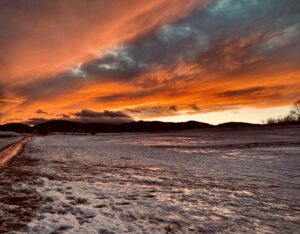
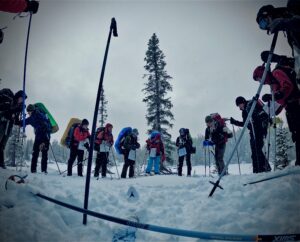
Study Away in Norway
Stuck in a Snow Storm
Kayaking Class Trip in Southern Norway
– LESS
Hello, my name is Kainu’u Gavin. I am currently studying at Endicott College, pursuing a degree in Sport Management with minors in Esport Management and Philosophy. I recently had the opportunity to study abroad in the great country of Ireland this past spring semester.
During my five months abroad, I stayed in Cork City in County Cork, Ireland. My location within the city allowed me to enjoy the many wonders Cork City had to offer. Whether it be from attending local sporting events, excellent restaurants, and art galleries, it helped me better understand the culture and atmosphere of living in Ireland. It allowed me to interact with some new friends from the university I was attending, Munster Technological University (MTU), and develop long-lasting friendships.
Public transportation was a significant element because it helped me get to MTU and visit some other Irish cities, such as Dublin, Limerick, and other European communities. I chose to travel to England during my spring break and had a memorable time I will never forget. I hope to be able to study abroad again in the future, possibly conducting my semester internship with The Cork County Board of the Gaelic Athletic Association (Cork GAA) or The Cork City Football Club (Cork City FC).
To anyone interested in or on the edge of wanting to study abroad, now is your chance to take advantage of this once-in-a-lifetime opportunity. Studying abroad has had a long-lasting impact on my understanding of the world and myself. You will also be able to learn about new cultures and make some lifelong friends down the road. Hopefully, you take this into consideration. Please let me know if you have any questions, as I would be happy to answer them.
Until next time,
Kainu’u Gavin
– LESS
Scott credits Koniag Education Foundation for providing a foundation for his academic career. “KEF has supported me throughout my post-secondary career and provided more opportunities than I imagined. Through these experiences, I have become aware of KEF’s intentions to benefit and invest in students. His long-term plans include completing his final year of his master’s program and then working for Koniag, Inc. while beginning his Ph.D.
“Believe in yourself, as your presence as an Alaskan Native is monumental, and to understand that our ancestors would be proud” is Scott’s advice to fellow students. “Our ancestors and elders endured some of the worst treatment, yet we are still here. You are the ancestors and elders to the next generations and passing on the strength and courage expressed by our people is one of the most beneficial aspects of being an Alaskan Native. We will continue to pass on our Native identity and express our strengths and capabilities through anything thrown at us.”
– LESS
For Keane VanTrease, college was a tough adjustment following the rigid structure of high school. It was challenging for someone who wasn’t familiar with having to block out time for work or learn on their own. Keane quickly realized that managing his time was influential during his first year of college. He made the dean’s list his last semester of sophomore year by holding himself accountable to a schedule and focusing on his grades.
Double majoring in Economics and Management, Keane has set his sights high and plans to obtain his graduate degree in business, law, or both.
“I love economics. I’ve had several classes so far that have made me choose that as my primary major. Regardless, I still wanted to major in business school, so I chose a management major to balance my studies and potential options after graduation. I think applying economic concepts graphically and determining how one variable affects others is interesting and personally my favorite part of my field of study,” says Keane.
Keane has loved the opportunity to take on leadership roles and meet new people through his fraternity. He serves on their executive board, helping to make decisions and planning events. His leadership skills don’t stop there. As one of this year’s Angayuk Interns and Scholarship recipients, he provides other students with guidance from his experiences, “if you can be on top of your schedule and work from the start and manage your time well, you’ll be ahead of the curve.”
The Angayuk Interns are currently in Kodiak, fulfilling the remainder of their internship with Koniag. Following their trip, Keane plans to visit Washington State with his family and then travel through Italy.
– LESS
My name is Patricia Wolkoff and I am from Anchorage Alaska. Growing up on Kodiak Island, gave me the desire to travel and see as much of the world that I can soak in. My love for travel and yoga have led me to India, and recently Ecuador where I learned traditional healing from local Shamans. Learning new cultures and meeting new people have given me a bigger perspective on life and myself, which, led to the desire to complete my degree after a decade long hiatus.
My philosophy on life and goals have changed tremendously since the first time I attempted college. Working towards my Bachelors degree has given me purpose and a future that will not only have personal benefits but, will also allow me to give back to my native community. I hope to share my love of yoga and dance by opening my own studio and provide virtual learning classes to reach people worldwide once I complete my degree in Business Administration.
This is my second year or third semester at Bay Mills Community College. I started at Bay Mills because my mother had begun courses a year earlier while working for a rural head start program that required further education. Observing her ambition and accomplishments inspired motivation and confidence for me to pursue completing my education goals. Currently I work part-time with our family-owned green cleaning business and pre-covid I worked as a yoga instructor.
– LESS
“Where are you from?”
For many people, this question bears little significance, or at least no complication. For me, this question poses an important quandary. I grew up a military brat. I was born in Hawaii, lived in Japan, and moved to Germany for most of my formative years, all while visiting stateside family in Minnesota and Washington every summer. The plurality of my childhood made establishing my personal identity difficult. Initially, I was jealous of my cousins in Minnesota and Washington. Each of them would spend their entire childhood in one place, within driving distance of our grandparents and within the same circle of friends. At the same time, I endured countless goodbyes, leaving close friends behind every two to three years and learning to swallow my emotions every time we left our aging grandparents for the upcoming school year. Growing up, I did not recognize the opportunities my childhood afforded me. I remember my father forcing my brother and me to play for the local, German ice hockey team despite our complaints and my mother pushing our family to continue exploring yet another European city despite our lagging enthusiasm.
As I got older I began to embrace the unique experiences of my childhood and the qualities they imparted in me. I grew adventurous in my overseas environment, but, most importantly, the role models of my military community imparted in me a burning passion for service. In college, I followed my burgeoning curiosity and desire for service, enrolling in the Reserve Officer Training Corps (ROTC). I similarly explored the unknown as a volunteer EMT, hoping to gain proficiency in basic medical skills while providing support for my local, underserved rural community. These two experiences, initially exploratory ventures, became the foundation for my later undergraduate pursuits and developing professional goals.
I discovered myself in the proud, independent people of rural North Dakota and in my brothers and sisters in arms. I pursued my interest of the sciences in my university classes, but I nurtured my burgeoning passion for medicine and public health as I worked within the community. One particularly relevant ambulance call remains deeply engrained in my memory. During my first year in Grafton we transferred a farmer who was a World War II veteran. During the ride to the hospital the topic of my ROTC membership arose, and prior to dropping him off at the emergency department he thanked me not only for my medical aid, but also for my military commitment. This man had experienced ordeals I could not even imagine, and yet he still thanked me. He epitomizes two characters closest to my heart—the soldier, sacrificing without expectations of gratitude, and the rural worker, living with limited access to amenities many of us take for granted.
Thinking about the image of this man in the middle of a health crisis and future patients like him I will encounter motivates me to improve my ability to make a significant, positive impact upon their lives. I seized the opportunity to embark on a cultural and occupational exchange program (CULP) with the German military to gain experience working within the kind of multinational, allied workforce I will inevitably encounter as a future military physician. I conducted research at a federal institution and at the University of North Dakota so I could develop my ability to think critically and innovatively as a physician. I confronted my fear of heights to become military parachutist-qualified so that I will be prepared to quickly deploy with any of my future soldiers should the need arise. My current and past experiences with the military offer me valuable lessons in service. As a child, I grew up in awe of the tenacity and generosity of our community’s soldiers, and as I embarked upon my own path towards military service I grew cognizant of the unique combination of domestic and international service opportunities a military career could support.
I take after my mother’s side of my family (coincidentally the side from where I claim my Alutiiq ancestry) in that I enjoy staying busy. Every day is demanding, but I am deeply engaged in a field that I love. The successes I’ve experienced throughout my childhood and in college can all be attributed to the mentorship I’ve received from my family and individuals within my communities. And although I experienced geographic separation from the Alutiiq community during my childhood in Germany and throughout my university education in North Dakota, the support I’ve received from its members continues to inspire me to pursue opportunities to not only improve myself, but to improve others now as a mentor and tutor, and hopefully in the future as a community-conscious physician.
– LESS
Kelly is a junior at Washington State University and is working to earn her undergraduate degree in athletic training with a pre-physical therapy specialization and a minor in psychology. After completing her undergraduate degree Kelly plans on attending physical therapy school to earn her Doctor of Physical Therapy degree, and has a goal to specialize in sports physical therapy.
– LESS

